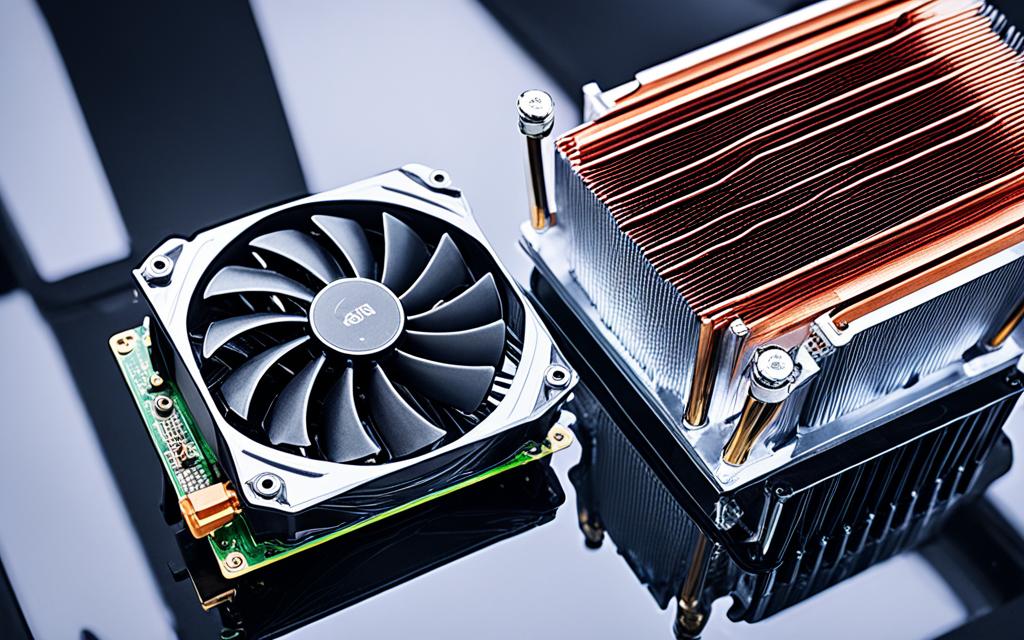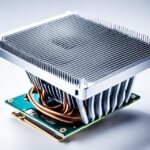Table of Contents
In the world of tech, making sure your CPU cooler fits your motherboard is key. This ensures your computer works at its best. With so many gaming PC cooling solutions out there, knowing how they match up is important. Most CPU coolers work with both AMD and Intel processors. But, different socket types through the years can bring unexpected problems1.
You must consider factors like socket type and cooler fitting. The Thermal Design Power (TDP) and how much space you have are also crucial. These steps prevent overheating and make your system stable1. By sticking to these guidelines, you can pick the right cooler. And you’ll boost your CPU’s life and performance.
Key Takeaways
- Understanding CPU cooler compatibility is crucial for preventing overheating and system instability.
- Both AMD and Intel processors have specific socket types that impact cooler compatibility.
- TDP ratings provide insight into the cooling performance needed for your specific setup.
- Measuring available space is essential to ensure your CPU cooler fits properly with no obstructions.
- Consult manufacturer documentation for detailed compatibility information on CPU coolers and motherboards.
Understanding CPU Cooler Compatibility
When you’re building or upgrading a PC, making sure the CPU cooler and motherboard work together is key. If they don’t match, your computer can overheat. This might damage the processor and make your system unstable. Knowing about common issues helps you choose the right cooler for a smooth, cool-running PC.
Importance of Compatibility
To get the right cooler and motherboard fit, look at the socket type first. It’s important because it affects cooling. Coolers are made for certain sockets, crucial for keeping your CPU cool1. While many coolers work with both AMD and Intel, not all fit every socket type1. You should also check the space around the CPU socket to ensure good airflow2.
Matching the Thermal Design Power (TDP) rating of the cooler to the CPU is also essential. And don’t forget to measure if the cooler will fit in your case. This keeps everything running smoothly.
Common Compatibility Issues
One big problem with CPU coolers is when the socket types don’t match. This can stop your cooler from working well. Make sure the cooler’s TDP rating is the same or higher than the CPU’s to prevent overheating1. Also, checking the cooler’s size is crucial to ensure it fits without blocking other parts2.
Look at the cooler’s height, width, and length in millimetres. Compare these to your case’s dimensions2. It’s important to leave enough room between the cooler and the graphics card, too. This helps with cable management and keeps air flowing correctly3.
Identifying Your CPU Socket Type
Knowing your CPU socket type ensures your CPU cooler fits your motherboard. Learning about different socket types helps choose the right cooling solutions. For instance, Intel’s LGA 1700 and AMD’s AM5 require special cooler designs. This knowledge prevents compatibility problems.
Popular Socket Types Explained
Today’s market has several common CPU socket types. For Intel CPUs, the popular ones are:
- LGA 1700
- LGA 1200
- LGA 1151
For AMD, the sockets include:
- AM5
- AM4
- FM2+
These sockets serve different CPU generations. Brands like CyberPowerPC, HP, and MSI might not share cooler model details. However, they do specify if a system uses liquid or air cooling4.
How to Find Your Socket Type
Figuring out your CPU socket type is straightforward. First, check your motherboard’s product documentation or its website. If that fails, a close look at your CPU cooler might help. Open your PC case to find any logos or labels on the cooler4.
Another way is to compare the cooler’s mounting method with the motherboard specs. Sometimes, removing the cooler reveals the socket type. Keep in mind important sockets like LGA 1700 and AM4/AM5 when looking5.
How to Know if CPU Cooler is Compatible with Motherboard
Understanding if your CPU cooler fits with the motherboard is key for a smooth computer build. Start by checking cooler compatibility and seeing how the cooler’s mounting works with the motherboard. It’s important to check the socket type and other details to avoid problems.
Checking Cooler Socket Compatibility
To figure out if a CPU cooler matches a motherboard, first look at the cooler socket compatibility. Most makers list which socket types their coolers work with. Since over 95% of PC start-up problems are due to CPU and motherboard compatibility issues6, this is a crucial step. Make sure the cooler fits your motherboard’s socket type. Not all coolers fit every socket type, but many fit both AMD and Intel1. Also, check if you have all the mounting brackets you need.
Reviewing Manufacturer Specifications
Looking at the manufacturer specifications can clarify installation needs. Brands often detail which CPU sockets their coolers are compatible with. This prevents mix-ups about RAM space, especially with big coolers that might block RAM slots in Mini ITX cases7. The cooler’s TDP rating is also critical. It should match or be higher than the CPU’s TDP for good thermal management1.
Evaluating Thermal Design Power (TDP) Ratings
TDP ratings are vital in choosing a CPU cooler. They show the max heat a CPU can produce. By understanding this, users can pick a cooler that fits well and cools effectively. This guarantees top performance and stability. Also, CPU and motherboard TDP ratings vary, making the choice of cooling solutions trickier8.
Understanding TDP and Its Importance
TDP tells us the heat a cooler must manage. With CPUs having different TDPs, a matching cooler is crucial to prevent overheating. Take the Intel i5-11500, for example. Its high TDP needs a strong cooler. Ignoring this can shorten system life and lower performance. Good cooling is key for task stability910.
Selecting a Cooler with Adequate TDP
Choose a cooler with a TDP rating that meets or beats your CPU’s. This ensures it can handle the heat, particularly for high TDP CPUs. Consider overclocking needs and case size too. Bigger coolers might not fit. Your setup’s success depends on a wise TDP and cooler choice. For deeper looks, sites like checking CPU cooler compatibility help a lot8.
Assessing CPU Cooler Clearance
Choosing the right CPU cooler is crucial. You must ensure it will fit in your system for the best performance. Enough space guarantees the cooler slots in without hitting other parts. This helps it work better by keeping your computer cool.
Measuring Available Space
Measuring your space is the first step. Check how much room you have, considering the cooler’s size. Remember to look at other parts like RAM and the GPU. They might block the cooler’s fit. For instance, Noctua advises you to ensure the cooler won’t clash with RAM or PCIe11.
Potential Clearance Obstructions
Clearance troubles aren’t just about RAM height but also how other parts are laid out. Big coolers offer more cooling but might not fit in small spaces12. Liquid coolers usually fit better and are great for high performance12. It’s also key to think about airflow. Good airflow stops overheating, keeps your system stable, and parts lasting longer.
Conclusion
Choosing the right CPU cooler is a big part of setting up your computer. It’s key to know about socket types, like Intel’s LGA or AMD’s PGA. This prevents problems with compatibility, as seen in various studies1314. Also, watch the TDP ratings to make sure the cooler can handle the processor’s heat. This means better cooling and improved computer performance.
Size matters too when picking a cooler. It has to fit in your computer case without blocking other parts, such as RAM or PCIe slots1314. In smaller computers, there’s less room, so the cooler’s height is really important. Every computer case has its own size limits. That’s why knowing the maximum height for a cooler is crucial for a neat and working setup.
Good airflow and sticking to size and heat limits are keys to a well-running computer. With the right motherboard and cooler match, you can boost your system’s cooling. This protects your tech investment and keeps your computer running smoothly for a long time.
FAQ
How do I ensure my CPU cooler is compatible with my motherboard?
To check for compatibility, first make sure the cooler’s socket type matches your CPU’s socket. Next, confirm it has the right TDP rating. Look at the product details for how it mounts and what extras are needed for fitting.
What are the common compatibility issues I should be aware of?
Often, problems arise from mismatched socket types, coolers not meeting the TDP, or big coolers hitting RAM or GPU. Knowing these issues helps prevent system overheating and instability.
How can I identify my CPU socket type?
Your CPU socket type can be found in the CPU’s manual or online. Look for details about Intel’s LGA1700 or AMD’s AM5. Each type demands certain cooler designs.
Where can I find information on my cooler’s socket compatibility?
Manufacturers list compatible socket types and important mounting info either on their websites or product packaging. Checking these details ensures your cooler works well with your motherboard.
What is TDP, and why is it important for my CPU cooler?
TDP stands for Thermal Design Power, showing how much heat a cooler can handle. It’s crucial your cooler’s TDP is as high as or higher than your CPU’s. This helps keep your system cool, vital for tasks like gaming.
How do I assess clearance when selecting a CPU cooler?
Measure your case’s space to check for cooler clearance. Remember to check the cooler’s height and possible blockages from other parts like RAM or graphics cards. Enough clearance ensures better airflow and cooling.
What can happen if I use an incompatible CPU cooler?
Using the wrong CPU cooler can cause overheating, harming your processor. It might also reduce system performance, affecting gaming or other intensive tasks, and shorten your components’ life.
Source Links
- https://www.overclockers.co.uk/blog/how-to-check-cpu-cooler-compatibility/ – How to check CPU cooler compatibility
- https://softwareg.com.au/blogs/computer-hardware/how-to-know-if-a-cpu-cooler-will-fit – How To Know If A CPU Cooler Will Fit
- https://www.makeuseof.com/what-to-look-for-when-buying-a-cpu-cooler/ – 8 Factors to Consider Before Buying a CPU Cooler
- https://www.xda-developers.com/how-find-cpu-cooler/ – How to find out what CPU cooler you have
- https://www.intel.com/content/www/us/en/support/articles/000005931/processors/intel-xeon-processors.html – How to Identify Your Intel® Desktop Processor Socket
- https://www.pcguide.com/cpu/how-to/tell-if-compatible-with-motherboard/ – How to tell if a CPU is compatible with your motherboard
- https://www.cgdirector.com/check-cpu-cooler-compatibility-motherboard-ram-case/ – How To Check CPU Cooler Compatibility with Motherboard, RAM, and Case
- https://ms.codes/en-ca/blogs/computer-hardware/how-to-know-if-a-cpu-cooler-is-compatible – How To Know If A CPU Cooler Is Compatible
- https://ms.codes/blogs/computer-hardware/how-to-know-if-a-cpu-cooler-will-fit – How To Know If A CPU Cooler Will Fit
- https://forum-en.msi.com/index.php?threads/default-motherboard-pl1-pl2-values-for-65w-cpu.366349/ – MSI Global English Forum
- https://noctua.at/en/buying-guide-cpu-coolers – Buying guide CPU coolers
- https://www.tomshardware.com/reviews/cooling-buying-guide,6105.html – How to Buy the Right CPU Cooler: A Guide for 2021
- https://softwareg.com.au/blogs/computer-hardware/what-cpu-cooler-is-compatible-with-my-motherboard – What CPU Cooler Is Compatible With My Motherboard
- https://ms.codes/en-ca/blogs/computer-hardware/do-all-cpu-coolers-fit-all-motherboards – Do All CPU Coolers Fit All Motherboards








